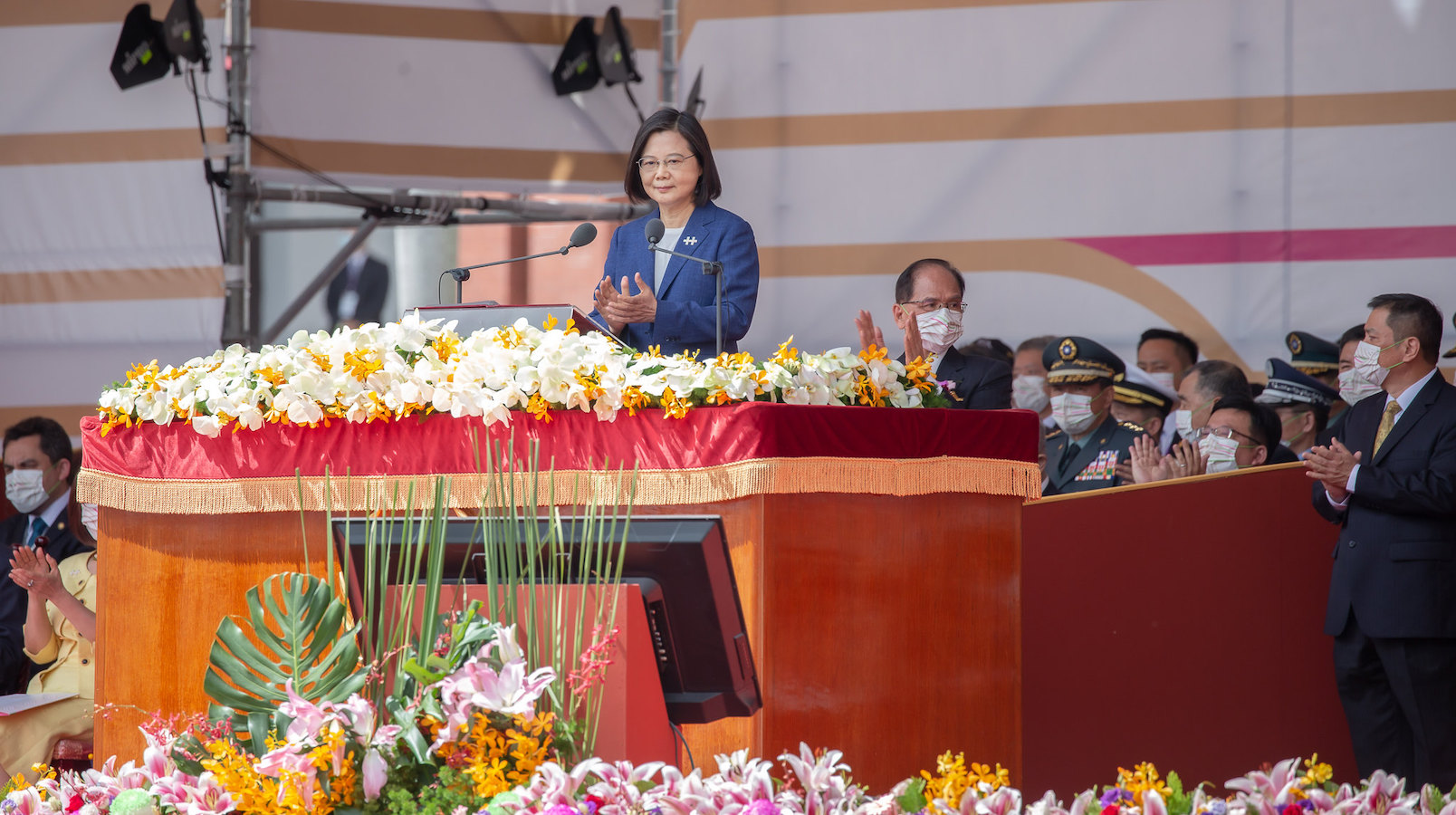by Brian Hioe
語言:
English
Photo Credit: Simon Liu/Presidential Office/CC
BOTH TSAI ING-WEN and Xi Jinping made major speeches over the weekend on the issue of cross-strait relations, as well as other issues. This was to be expected, because of the fact that today is Double Ten Day, the founding holiday of the ROC.
Xi’s speech, which was delivered yesterday morning ahead of Tsai’s today, has been read as less directly threatening than previous years. Xi did not bring up the threat of military force, per se, claiming that “reunification” would be “peaceful.” Xi may be hoping to avoid a repeat of what happened in 2019, when a speech stating that the use of force against Taiwan was still on the table to achieve reunification led to backlash from the public, who instead rallied behind Tsai. Nevertheless, this takes place immediately after successive days of Chinese air incursions involving the deployment of well over a hundred warplanes to Taiwan’s Air Defense Identification Zone, which could potentially have a similar effect.
 Chinese president Xi Jinping. Photo credit: Jean-Marc Ferré/UN/Flickr/CC
Chinese president Xi Jinping. Photo credit: Jean-Marc Ferré/UN/Flickr/CC
Likewise, during the speech, Xi still urged that advocates of Taiwanese independence would be punished and dealt with. In this sense, Xi’s speech still did involve threats, though most international news headlines framed the speech as Xi not doing so. More substantively, one notes that Xi’s speech was emphatic on the links between Taiwan and China through the frame of the 1911 Xinhai Revolution, perhaps indicating CCP support for the KMT’s current political framework of defending the ROC and its historical institutions.
After Xi’s speech, former president Ma Ying-jeou asserted that the 1992 Consensus was necessary for cross-strait relations. It would not be surprising if the CCP continues to maintain an emphasis on the 1992 Consensus as well, though the CCP has sometimes misfired through attempting to assert “One Country, Two Systems” as the framework for reunifications in the past, at a time of high awareness of the downturn in political freedoms in Hong Kong.
As such, Tsai’s speech, which was delivered today, was in some respects responding to Xi’s speech. There were no real surprises in Tsai’s speeches. Where domestic policy is concerned, Tsai focused on transition to sustainable energy, to preserve Taiwan for future generations, and the need to ensure a self-reliant economy. Likewise, Tsai touted contemporary Taiwan as a pluralistic, diverse place, while referencing Taiwan’s recent Olympics wins as putting Taiwan on the international stage. In this, Tsai’s references were mostly to the ROC rather than Taiwan specifically, with Tsai emphasizing the historical shifts that had occurred in the ROC with the shift from authoritarianism to democracy.
When it came to cross-strait relations, Tsai called for dialogue to be conducted between China and Taiwan on the basis of parity and calling for an easing of cross-strait relations. To this extent, Tsai emphasized that Taiwan would stand up for itself against threats, Tsai bringing up the recent air incursions as well as the suppression of pro-democracy activists in Hong Kong. Tsai framed China as seeking to overturn the rules-based order in the Indo-Pacific regarding contested areas such as the South and East China Seas.
 Taiwanese president Tsai Ing-wen. Photo credit: Wang Yu Chin/Presidential Office/CC
Taiwanese president Tsai Ing-wen. Photo credit: Wang Yu Chin/Presidential Office/CC
At the same time, Tsai touted increasing international support for Taiwan, including from the US, Japan, Australia, and European countries such as Lithuania, Slovakia, Poland, and the Czech Republic. Tsai thanked countries that had donated vaccines to Taiwan in the wake of the COVID-19 outbreak and touted regional cooperation against shared threats. Tsai brought up Taiwan’s application to join the CPTPP and talk conducted with the US as part of TIFA. At the close of her speech, Tsai brought up the military parade that took place on Double Ten Day this year—on a larger scale than in past years—regarding the issue of Taiwan’s military readiness in the face of Chinese threats. Tsai praised members of the military, likely hoping to allay criticisms from the KMT that her administration disregards the military.
No particular earthshaking events took place in terms of either Tsai or Xi’s speeches over the weekend, then. That being said, again, both speeches were made in the wake of unprecedented Chinese military threats directed at Taiwan, which are likely to continue. And, as reflected in how much international media reported on these events, Taiwan’s own stance on the matter may be disregarded, with Taiwanese voices scarcely afforded any mention.

